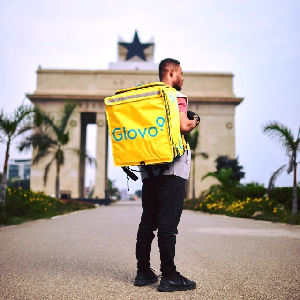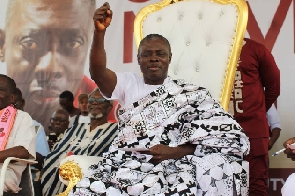- Home - Sports
- Soccer Portal
- Archived Sports News
- Sports Videos | TV
- Year In Review
- Sports Photos
- Sports Headlines
- Boxing
- Athletics
- Basketball
- Bodybuilding
- Cricket
- Golf
- Handball
- Hockey
- Martial Arts
- Tennis
- Volleyball
- Other Sports

Soccer News of Tuesday, 27 February 2001
Source: Post Express (Lagos)
OPINION: Lessons From Ghana As Liberia Lurks (Part iii)
A decent appearance at the World Cup finals increases a player's market value, and money (lots of it) starts rolling in. It is in this regard that Nigeria has done a mighty big favour to our patriot-turned "mercenaries.
Take Austin Okocha as an example. Charles Bietry, who was at the helm of affairs at Paris Saint Germain (PSG) at the time, did not make a secret of the fact that it was Okocha's Grade A performance at France '98 that convinced him to splash the whopping $17 million (N2.1 billion) to move him from the Turkish side, Fernabehce. So it goes without saying that Okocha should be thankful that Nigeria gave him the chance to sell himself at the highest level. (Today, the average earning of our foreign based players is not less than $7,000 (or N868,000) per week, and this does not include winning bonuses).
For God's sake, should it be the same lad (Okocha) who almost totally went beserk in Port Harcourt even threatening to beat up Dominic Oneya, the NFA chairman if the latter did not come up with an additional $1,000 for each player? After all, to him (Okocha), he and his teammates had just performed a "miracle" by beating Sudan in the home leg of the World Cup qualifier. To him and his fellow "mercenaries," $6,200 (or N768,800) for one day's work, is way too small
My fellow patriot, I do not know how many of you get to take home such an amount in a year. Bu I can tell you that our dear President, Olusegun Obasanjo, does not make it in a month. Obasanjo's monthly salary is N310,000, and this depends on whether the National Assembly debates and approves such recommendation of the Revenue Mobilisation and Fiscal Committee. It might also interest you that the Vice President makes N250,000 per month, the Senate President - N200,000 monthly, with top officials like the Chief Justice of the Federation, Speaker, Deputy Senate President, Deputy Speaker etc. - all hovering around N180,000.
Yes, we can argue that professional footballers, like other professionals, especially in the entertainment industry should not be limited in their income since their lifespan as top performers does not usually exceed 15 years, sans injuries, of course.
But our footballers need to be told that they cannot afford to forget where they started from. Instead of continuously seeking to milk the country, they should be involved in the act of saying a big 'THANK YOU' to their country and supporters who jointly have created avenues for them to escape from the abject poverty which is the lot of friends, relations, and fellow countrymen they left back home. They should remember that many of their supporters who never fail to throng the National Stadium under the burning sun for several hours, are not guaranteed three meals a day or transport money, to and from the Stadium.
Taribo West, the new "savour" of English Premiership's Derby County and the Super Eagles's "rock of Gibraltar" is now also a pastor. Good. But the pastor in him should tell him that he should never involve himself in the constant expression of an inordinate love of money by his colleagues. I hope he will start to convince his team mates that greed often kills. As a fellow Minister of God, may I refer him to the Holy Book which in proverbs 15:27 tells us "He who is greedy for gain, troubles his own house. But he who hates bribes will live."
Taribo should be seen to be leading a more noble campaign that he and his colleagues should thank God everyday of their lives for the chance the Almighty God granted them to be rich and famous.
Super Eagles players should not ask what their country will do for them but to continue to pay back for the rest of their career. This is how they can find inner peace. Holding the country to ransom by insisting on receiving payments before going to the field, amounts to asking for "bribes" and as the Holy Book says, it is not the best way to live. Have our super rich Super Eagles ever thought it necessary to use their individual and collective connection and resources to arrange for international friendlies in Europe, since the lack of sufficient funds is the only hurdle in NFA's way?
Thank God for little mercies, there are still a few of the players who have not yet joined in the rat race" for money. When waiting journalists asked two of the new members of the Super Eagles why they were not with their colleagues who were locked in a 'battle' for more money with NFA officials immediately after the Sudan match in Port Harcourt, the Shell-stricken young players replied:" Those big boys are too greedy. All they know and talk about is money, money, money."
If care is not taken however, and if players' insatiable thirst for money is not checked, even the now innocent ones would eventually join in their seniors' request for Nigeria to break the bank to satisfy their greed.
Can we really call the bluff of these players? This is the million naira question. My answer is YES. We have done it before. We can do it again. Back in 1990, Westerhof called the bluff of the "big boys" who gave reasonable conditions before they would come to play for their country for that year's Africa Nations Cup in Algiers. In the tournament's opening match, the team of "nobodies" which Westerhof took to Algeria, were promptly disgraced 5-1 by hosts Algeria. But Westerhof and his players showed an exemplary strength of character by going all the way to the final, where they narrowly lost 1-0 to the same home team, in a match which could have gone either way, judging from the overall strength of play.
More recently, intent on calling the bluff of their pompous stars abroad as part of her preparation towards the France '98 World Cup, Nigeria experimented on another team of nobodies to four-Nation invitational tournament in Honk Kong, featuring hosts Hong Kong, Hungary, Chile, and Nigeria. Against popular forecast, the scrappy Nigerian side was unbeaten and actually won the tournament.
The result sent shock waves around the world, especially to all the Super Eagles regulars in their foreign clubs. None of them was going to wait for an invitation from Nigeria's football officials, which might not come. They made frantic inquiries and other overtures to the NFA or anybody of any kind of influence in the country's football community, knowing fully well that their places as regulars were threatened.
That was the golden opportunity our country had to force on the players a code of conduct, non-adherence to which is a sure way of being left out of the team. Let no one be of the illusion that a single player in our Super Eagles is indispensable. Not one.
If anything, with a little hindsight, Nigerians should thank Nwankwo Kano for choosing to ignore the last Olympic Games in Sydney. If he had gone to Sydney, young Victor Agali, our latest scoring sensation and the first out-and-out striker since age slowed down Rashidi Yekini, would not have gotten a shirt. We all know that coach Jo Bonfrere's loyalty to the players who once did well for him is not in doubt. How else can you describe Bonfrere's unpopular decision to play our out-of-form, and visibly unfit second division foreign based player, Emmanuel Amunike, a former African player of the year seven years ago, and who scored the winning goal of our Atlanta '96 Olympic soccer gold medal triumph.










